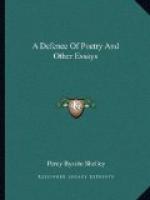But there is nothing necessarily evil in this error, and thus cruelty, envy, revenge, avarice, and the passions purely evil, have never formed any portion of the popular imputations on the lives of poets.
I have thought it most favourable to the cause of truth to set down these remarks according to the order in which they were suggested to my mind, by a consideration of the subject itself, instead of observing the formality of a polemical reply; but if the view which they contain be just, they will be found to involve a refutation of the arguers against poetry, so far at least as regards the first division of the subject. I can readily conjecture what should have moved the gall of some learned and intelligent writers who quarrel with certain versifiers; I confess myself, like them, unwilling to be stunned, by the Theseids of the hoarse Codri of the day. Bavius and Maevius undoubtedly are, as they ever were, insufferable persons. But it belongs to a philosophical critic to distinguish rather than confound.
The first part of these remarks has related to poetry in its elements and principles; and it has been shown, as well as the narrow limits assigned them would permit, that what is called poetry, in a restricted sense, has a common source with all other forms of order and of beauty, according to which the materials of human life are susceptible of being arranged, and which is poetry in a universal sense.
The second part will have for its object an application of these principles to the present state of the cultivation of poetry, and a defence of the attempt to idealize the modern forms of manners and opinions, and compel them into a subordination to the imaginative and creative faculty. For the literature of England, an energetic development of which has ever preceded or accompanied a great and free development of the national will, has arisen as it were from a new birth. In spite of the low-thoughted envy which would undervalue contemporary merit, our own will be a memorable age in intellectual achievements, and we live among such philosophers and poets as surpass beyond comparison any who have appeared since the last national struggle for civil and religious liberty. The most unfailing herald, companion, and follower of the awakening of a great people to work a beneficial change in opinion or institution, is poetry. At such periods there is an accumulation of the power of communicating and receiving intense and impassioned conceptions respecting man and nature. The persons in whom this power resides may often, as far as regards many portions of their nature, have little apparent correspondence with that spirit of good of which they are the ministers. But even whilst they deny and abjure, they are yet compelled to serve, the power which is seated on the throne of their own soul. It is impossible to read the compositions of the most celebrated writers of the present day without being startled with the electric life which




